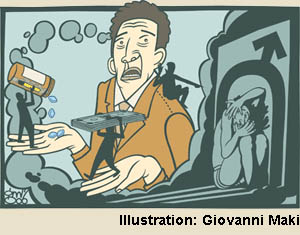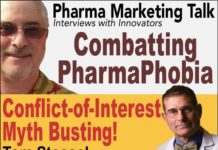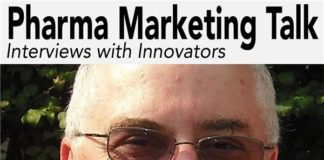Disease Mongering: Is It Real?
A conversation with Neil H. Gray, Managing Partner, Healthcare Trends & Strategies, LLC and Alex Sugerman-Brozan, Director, Prescription Litigation Access Project (see bios), about “disease mongering,” which is a term used to describe a perceived attempt by pharmaceutical companies to promote public awareness of (frequently harmless) conditions or diseases with the aim of increasing sales of medication.
Aired LIVE on:
Tuesday, December 19, 2006 Listen to internet radio with Pharmaguy on Blog Talk Radio
You may also visit this Pharma Marketing Talk Segment Page to listen to the audio podcast.
This show and ALL Pharma Marketing Talk shows are available as podcasts via PMT on iTunes (FREE!).
Background

Disease mongering is a term that was coined by the late journalist Lynn Payer to describe what she saw as the confluence of interests by some doctors, drug companies, patient advocacy groups and media in exaggerating the severity of illness and the ability of drugs to “cure” them. Today’s definition includes the accusation that, for example, cardio metabolic syndrome is really a cluster of risk factors for patients with diabetes, hypertension and heart disease. This podcast provides a highly interactive debate incorporating the view points of people from both ends of the spectrum. It also explores the concern that pharma may be loosing credibility with physicians and the general public by “creating” these syndromes.
Some examples of “diseases” that the authors of a PLoS report consider “mongered” include:
- Restless leg syndrome – Prevalence of rare condition exaggerated
- Irritable bowel syndrome – Promoted as a serious illness needing therapy, when usually a mild problem
- Menopause – Too often medicalised as a disorder when really a normal part of life
Others that come to mind are SAD, Overactive Bladder, etc.
Some Questions/Topics Covered
- What’s your viewpoint on this issue? Is it a legitimate issue? Are the diseases mentioned verifiable medical conditions or do they represent fake diseases invented by pharmaceutical marketers? Who’s the authority on defining an illness?
- Are marketers overstating the prevalence of these and other conditions in order to inflate sales? Isn’t there a danger that by doing so, they set themselves up for failure to meet target goals (I’m thinking of the ED market here)? Would this lead to an ever-increasing need to widen the scope of the condition?
- How do patient advocacy groups and the media benefit from disease mongering? Is the pharmaceuticfal industry establishing and funding patient advocacy groups for this purpose?
- Is “disease awareness” just a euphemism for disease mongering? Is there a danger that legitimate disease awareness will morph into or spill over into disease mongering? How can pharma companies prevent that from happening? Is it necessary to take disease awareness out of marketing like CME was?
- Is the pharmaceutical industry losing credibility by promoting treatments for previously unknown conditions for which there are relatively few suferrers? Restless Leg Syndrome comes to mind.

Neil H. Grey: Bio not available

Alex Sugerman-Brozan: Bio not available
Additional Resources
- Pharma Marketing Blog post: Disease Awareness or “Disease Mongering?”
- Pharma Marketing News article: Disease Mongering: When Is the Line Crossed?
- Survey: Disease Mongering: Real or Fantasy?









![6 Digital Tools at the Center of Healthcare Digitalization [INFOGRAPHIC]](http://ec2-54-175-84-28.compute-1.amazonaws.com/pharma-mkting.com/wp-content/uploads/2021/04/6DigitalTools_600px-100x70.jpg)




